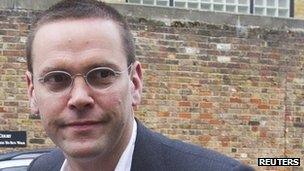News Corp's James Murdoch under pressure
- Published
- comments

About a third of votes from independent shareholders were against James Murdoch's re-election
The scale of the protest votes by independent shareholders against the re-election of James and Lachlan Murdoch to the News Corporation board was substantial.
About a third of votes were cast against them, with marginally more going against James Murdoch than against Lachlan Murdoch. But stripping out the votes of the Murdochs' own shareholding, and those of a Saudi prince who backs the family, a majority voted against the sons of Rupert Murdoch.
If abstainers are ignored, the votes against the brothers look even more sizeable.
The brothers can't be thrown off the board, because they were backed by the bloc of shares representing 47% of the votes controlled by their family and Prince Alwaleed Bin Talal.
Here are the numbers. If the prince's shares are regarded as informally aligned to those of the Murdochs, then 55% of independent shareholders voted against James Murdoch - and if abstainers are stripped out, the margin against him among independent shareholders rises to nearer 80% (there was an 80% vote against him among independent shareholders who actually voted).
However, the vote would be 48% against James Murdoch if the prince's shares are seen as non-aligned and abstainers are included in the denominator.
Strikingly, there was a much smaller protest vote against Rupert Murdoch, the de facto founder, chairman and chief executive of News Corporation. Some 14% voted against his re-election.
Also, this is not a company in which all shareholders are treated equally. At News Corporation, there are two classes of shares, "A" shares and "B" shares. Only the "B" shares carry votes. The Murdoch family has an economic interest in News Corporation of around 12% (its share of the "A" and "B" shares) but is able to exercise enormous influence because of its 40% voting interest.
'Robust independence'
The result of the vote, which took place last Friday but was only disclosed last night, is an embarrassment for James Murdoch: he wants to be seen as a talented business person in his own right, rather than the heir of one of the world's most powerful media tycoons.
James Murdoch's reputation has been hurt by having been in charge of News Corp's UK operations during the years when it failed to disclose the scale of phone hacking and wrongdoing at the News of the World.
Robert Peston says it is "dangerous" for Rupert Murdoch to ignore the will of his shareholders
Anne Simpson of the huge US pension fund, CALPERS, which voted against him, told the BBC the vote was about more than just concerns over what went wrong at the News of the World:
"I think this really tells the board investors are looking for change, they're looking for robust independence…
"Over 30% of the votes were withheld from five directors that includes James Murdoch, who's been called in this enquiry. It says to me that there's a wider challenge to the quality of the board, that investors are looking beyond the investigations. They are quite properly expecting due process for all concerned, but the real concern is that this is a board in need of rejuvenation and it's really in need of some robust independent oversight."
In a few weeks, James Murdoch faces another important vote, on whether he should remain as chairman of British Sky Broadcasting. At BSkyB, News Corporation has a stake of just under 40%. So, again, James Murdoch can be more-or-less guaranteed being re-elected on the basis of votes linked to his family.
But if a majority of BSkyB's independent shareholders were to vote against him, that would put the independent non-executives on BSkyB's board in a tricky position: according to a source close to the board, they would almost certainly feel obliged to ask James Murdoch to stand down.
"If James Murdoch did not have the backing of independent shareholders at BSkyB, I think his position would be very difficult, under the British governance system" said the source.
The outcome of the BSkyB vote may well hinge on how James Murdoch performs when questioned again by MPs on 10 November about what he knew and when about phone hacking at the News of the World.
A couple of his former colleagues have insisted that they made James Murdoch aware at an earlier stage than he concedes of an internal email, the so-called "For Neville" email, that indicated more News of the World journalists were involved in hacking than the company was admitting at the time.